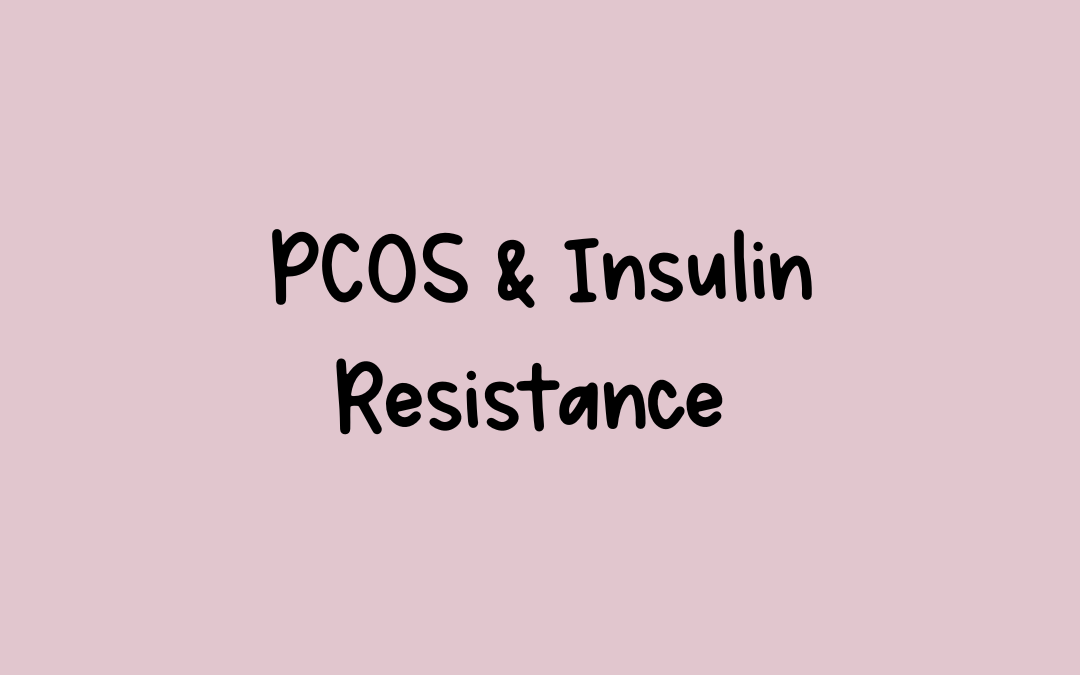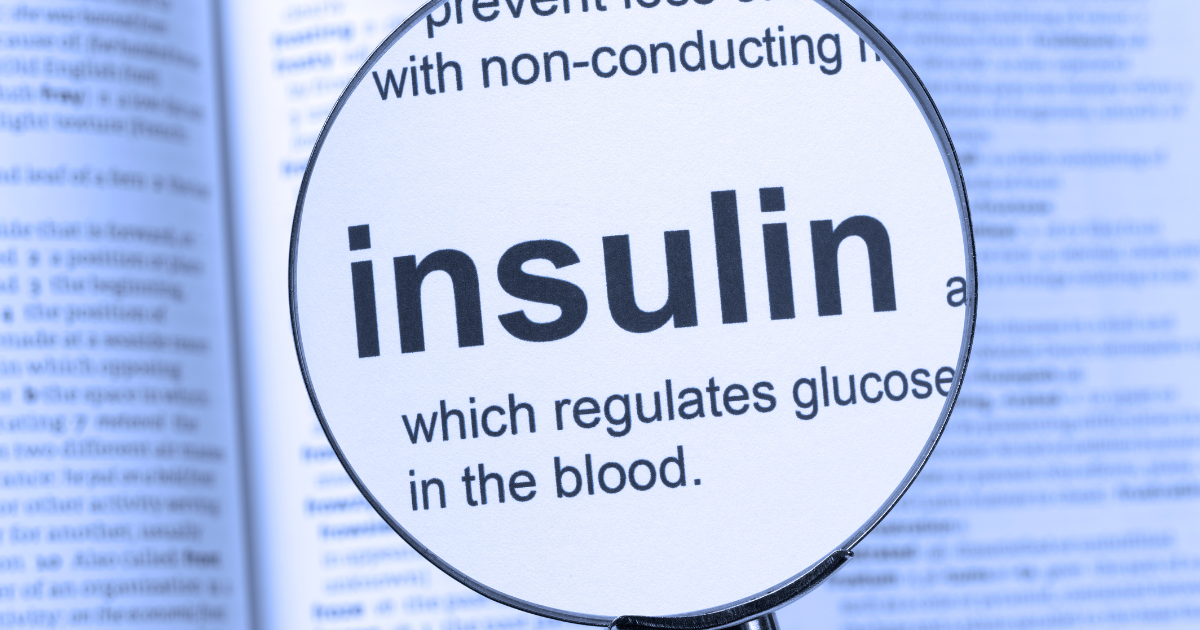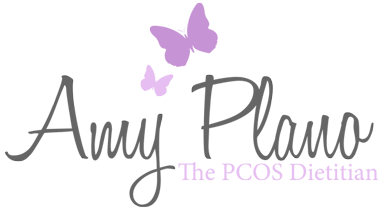
PCOS and Insulin Resistance: Everything You Need to Know
A common symptom and driver of Polycystic Ovarian Syndrome (PCOS) is insulin resistance or the inability of your body to effectively use the hormone insulin.
Did you know that up to 80% of women with PCOS deal with insulin resistance (IR)?
While it is not part of the diagnostic criteria for PCOS, the two are frequently associated with one another. If IR is not treated properly, it can lead to further hormonal and metabolic problems. Which for obvious reasons, you want to avoid!
In today’s article, I will be breaking down the connection between PCOS and IR. This includes what insulin resistance is, how it relates to PCOS, and my best tips for improving IR as a PCOS dietitian. Keep reading to learn more!
Are you pre-diagnosis and wondering if you have PCOS? Head over to this page on my website to learn more information about what PCOS is and how it is diagnosed.
What is Insulin?

Insulin resistance involves a naturally occurring hormone inside your body called insulin. Insulin is produced in your pancreas and regulates the amount of glucose, or sugar, in your blood.
How it works (in simple terms):
- When you eat food, it gets broken down into sugar and enters your bloodstream
- Your pancreas is signaled to release insulin
- Insulin works hard to help the sugar get used as energy in your cells or signals the liver to store the sugar to use later
- This lowers the amount of glucose in your blood
However, the process only works this way when your body is functioning how it should. People living with certain conditions, such as diabetes, develop the inability to produce and utilize insulin correctly.
What is Insulin Resistance?
Now that you’ve learned about insulin, let’s dive into what insulin resistance is. Insulin resistance is when your cells stop responding to insulin properly.
Imagine your pancreas is pumping out insulin in response to all of the sugar in your blood. After a while, your cells become sensitive or resistant to this insulin and aren’t able to use it in the right way anymore.
Typically your poor pancreas will react by making even more insulin until it can’t keep up any longer. As a result, your blood sugar levels stay high and can start to harm your body.
Symptoms of Insulin Resistance
So, how do you know if you are insulin resistant?
Typical signs and symptoms of insulin resistance to look out for in women with PCOS:
- Increased or frequent urination
- Excessive hunger or thirst
- Feeling tired all the time
- Feeling hungry after you eat
- Acanthosis nigricans (dark pigmentation and thickening of the skin)
- Elevated inflammatory markers and lipid levels
- High fasting blood sugar and insulin levels
- And more!
Gaining weight and difficulty losing weight are also associated with insulin resistance in women. However, it is important to note that signs and symptoms may be different for everyone.
IR is typically diagnosed using lab work that tests for fasting glucose and insulin levels, as well as the HOMA-IR index (a scale used to assess how your body uses insulin).
How are PCOS and Insulin Resistance Related?

Many people associate PCOS with a hormonal disorder involving the ovaries and ovulation, but it is also a metabolic disorder that has an impact on your whole body.
We are continuing to find out more and more about the connection between PCOS and insulin resistance. Many researchers believe that insulin levels are linked to PCOS because lots of women with PCOS have too much insulin inside their bodies.
Insulin resistance is not only a symptom of PCOS but can actually drive the condition and make it worse. Having high insulin levels in the blood is associated with an increase in androgen (male sex) hormones such as testosterone. We know that women with PCOS already have elevated levels of androgen hormones, so this is not ideal.
In the reverse direction, androgen levels can also increase insulin levels. Many women with PCOS find themselves in a vicious cycle because as one rises, the other follows along. Symptoms start to worsen and quality of life can absolutely decrease!
How are IR and Weight Gain Related?
I mentioned that IR can lead to weight gain- but why is this? When insulin levels are elevated, it causes you to store fat very easily. Insulin can also stimulate appetite and make you more hungry. As your insulin levels increase, you may find that you are craving more sugary and carb-rich foods.
Because of these factors, studies show that women with PCOS and IR are more likely to gain weight and have trouble keeping it off. They also have an increased risk for type 2 diabetes, obesity, and other metabolic complications.
If you have PCOS and struggle to lose weight, working on your insulin resistance is a great step towards reaching your weight loss goals.
Tips for Improving Insulin Resistance

Nutrition and lifestyle changes are the best way to improve insulin resistance. Lots of research is emerging on how with physical activity and the right eating patterns, insulin resistance can be repaired.
My best tips for addressing and improving IR:
- Focus on an overall nutrient-dense, balanced diet and a regular exercise routine that is sustainable for you and your lifestyle.
- You do not need to cut out all carbs! Instead, prioritize whole-grain and high-fiber carbohydrate options when possible.
- Examples include quinoa, whole wheat, brown rice, legumes, fruits, and vegetables
- Additionally, pair your carbohydrates with lean protein and healthy fats to create a balanced meal.
- Maintain a healthy weight and get regular bloodwork done to check glucose and insulin levels.
- Eat regular meals at regular intervals throughout the day and try to avoid skipping meals for periods time.
- Address any nutrient deficiencies that may contribute to IR such as vitamin D, vitamin B12, and omega-3s. Include whole food sources of these nutrients in your daily diet.
- Manage your stress levels and make sure you are getting good quality sleep at night.
Some women with PCOS may benefit from insulin-reducing drugs such as Metformin or Actos. It is important to consult with your healthcare team about what treatment options are right for you!
PCOS and Insulin Resistance: The Takeaway
If you are a woman with PCOS, it is likely that you are insulin resistant to some extent and could benefit from reducing insulin levels in your body.
Many signs and symptoms become tolerable after improving IR. Yes, there’s hope! You can use the tips I outlined above as a great starting point for addressing this underlying issue.
Looking for additional guidance and support with nutrition and PCOS? I know this all can be overwhelming at first, but don’t worry, I got you! You do not need to go another day being frustrated over your PCOS symptoms.
I am a specialized PCOS weight loss dietitian and am here to help. Head over to my services page to learn more about my personalized programs that are tailored to your individual needs. It is time to lose weight, get healthy AF, and feel fabulous along the way.
